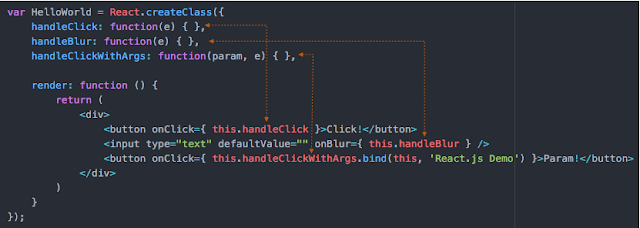The way of handling events in React component is much similar to DOM events processing in pure Javascript. You just define a response function and let it be the event handler and listen an event. React.js will be responsible for executing the event handler function when the listened event is detected.
The important difference to which you should pay attention here is that you set a handler via the event
props(property) of a React element instead of the event handler attribute of a HTML DOM element.
This is simple example where we only use one component. We are just adding onClick event that will trigger updateState function once the button is clicked.
App.jsx
import React from 'react'; class App extends React.Component { constructor(props) { super(props); this.state = { data: 'Initial data...' } this.updateState = this.updateState.bind(this); }; updateState() { this.setState({data: 'Data updated...'}) } render() { return ( <div> <button onClick = {this.updateState}>CLICK</button> <h4>{this.state.data}</h4> </div> ); } } export default App;
main.js
import React from 'react'; import ReactDOM from 'react-dom'; import App from './App.jsx'; ReactDOM.render(<App/>, document.getElementById('app'));
This will produce following result:
Child Events
When you need to update state of the parent component from its child, you can create event handler (updateState) in the parent component and pass it as a prop (updateStateProp) to your child component where you can just call it.
App.jsx
import React from 'react'; class App extends React.Component { constructor(props) { super(props); this.state = { data: 'Initial data...' } this.updateState = this.updateState.bind(this); }; updateState() { this.setState({data: 'Data updated from the child component...'}) } render() { return ( <div> <Content myDataProp = {this.state.data} updateStateProp = {this.updateState}></Content> </div> ); } } class Content extends React.Component { render() { return ( <div> <button onClick = {this.props.updateStateProp}>CLICK</button> <h3>{this.props.myDataProp}</h3> </div> ); } } export default App;
main.js
import React from 'react'; import ReactDOM from 'react-dom'; import App from './App.jsx'; ReactDOM.render(<App/>, document.getElementById('app'));

Helpful post, share more reactjs events.
ReplyDeleteLearn React js | React js Training in Chennai
ReplyDeleteWonderful post!!!! Thanks for updating.
Hadoop Training in Chennai
Big data training in chennai
big data training in velachery
JAVA Training in Chennai
Python Training in Chennai
SEO Training in Chennai
Hadoop training in chennai
Big data training in chennai
big data training in velachery
Awesome Article Keep on sharing
ReplyDeleteFull Stack Training in Hyderabad
Full Stack Training in Ameerpet
The knowledge of technology you have been sharing thorough this post is very much helpful to develop new idea. here by i also want to share this.Thank you for sharing wonderful information with us to get some idea about it.
ReplyDeleteoracle training in chennai
oracle training institute in chennai
oracle training in bangalore
oracle training in hyderabad
oracle training
oracle online training
hadoop training in chennai
hadoop training in bangalore
Excellent blog, informative and knowledgeable content. Thanks for sharing this blog with us.
ReplyDeleteMern Stack Training in Hyderabad
Mern Stack Online Training